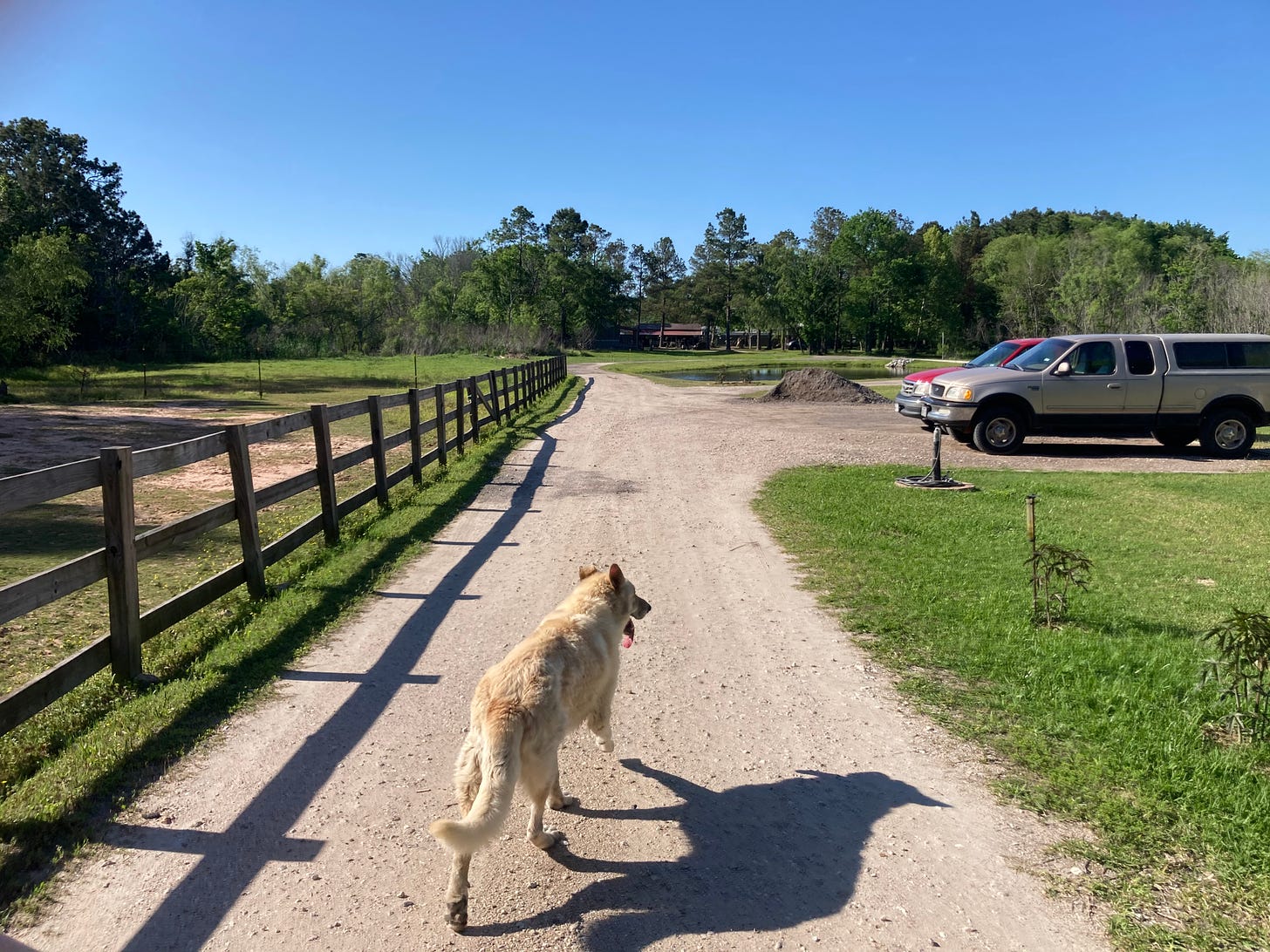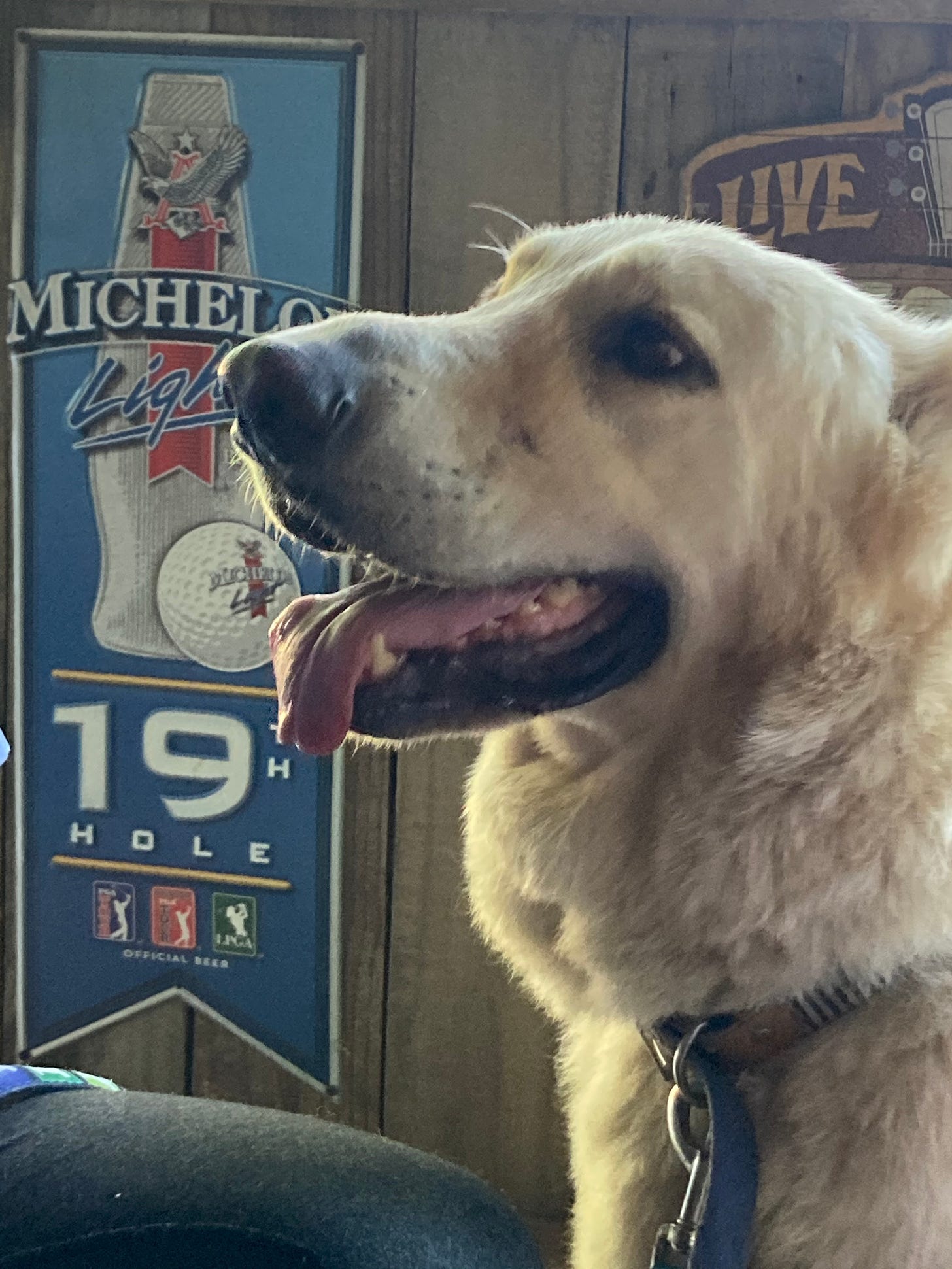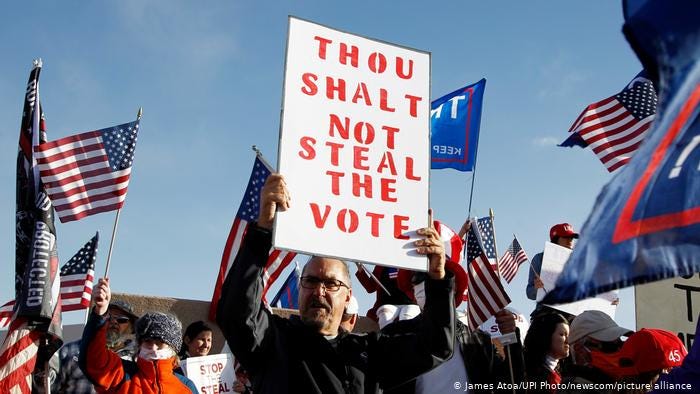Welcome to the 21st issue of Lazy Desperado! Thank you for reading, and thank you even more if you are a subscriber! This issue we take a look at the downsides to online discourse and how hard it is to realize going outside is finally Okay™. Plus.
About 3 weeks ago my fiancée, Haylee, was leaving to get our daily (or twice-daily, depending on the workload) cups of coffee and saw a stray dog near the entrance to the property we live on. Unfortunately, stray dogs and cats are normal in our area and while we do try to help the ones that we see, they usually run away before we can even get a good handle on how bad off they are. This huge, blond German Shepherd with weak legs and hands the size of mine was a little different.
By the time Haylee came back, the dog decided to lead her all the way back to our front door since he was still hanging out on the property. Knowing Haylee (and my own soft spot for any dog under the sun) , I knew we probably weren’t going to let this dog go until we could help him in some form or fashion. He’s nice, friendly, and listens well.
That’s about all he had going for him. His teeth were broken in multiple places, he had a twisted chain collar around his neck (which he probably chewed through, hence the teeth) , mountains of matted fur, weak back legs and a tinge of green from all of the flee poop, dirt and grime from his undetermined amount of time outside.
Since it was about to storm, we put out food and water and opened our roofed porch to him. I thought we’d have him a max of 3 days, expecting him to wander off the porch to the next spot since we left it open for him. This scammer has gotten baths, a bad, food, love and free vet care from local community members, Friends of Fay, who pitched in after I posted him to a Facebook lost/found pet group for my area. Haylee must have combed several pounds of old hair and matted gunk out of his fur the first week.
He’s now a 90-pound gentle giant keeping us company on our porch until we can get him to his next foster or a permanent home. After tossing around several names, from Germy to Pallino (our neighbors are huge bocce ball fans), we settled on the name Zach for the boy. He loves long walks, dropping gigantic poops in our neighbor’s yard and playing with his pet llama
Would we love to keep Zach? Of course. He’s funny, friendly, on his way to better health and is very loving to us and our neighbors. We can’t, sadly, because we don’t have the room and our queen Diamond would be crushed. We know he needs a home with more resources and time to take care of him, especially the leg and hip issues we see daily. Right now he’s clean, vaccinated, sheltered and ready to move on. We love dogs, a ton, and we really want to make his life better any way we can.
This whole situation reminded me that being helpful can seem stressful, impossible and overwhelming when the stakes are so serious. He’s a living being and I just wanted him to be okay, as did Haylee, and we made it work with what we had. We’re lucky, and we’re happy that luck could help this dog and the stress has been worth it. Now, let me see if I can accept that fact for the longer term goals I have.
Share this newsletter with your friends and family and your local street cat. Make this letter bigger so we can improve the content, gain attention we need and provide better content more often. The more references this letter gets, the more clicks we get, the more guest articles I can publish, and the more people we can help with important info, a good laugh or two, or a helping hand for creating their own work.
Thank you for subscribing, and as always SHARE this newsletter through really bad SNL sketches, VBucks and illegally downloaded copies of Resident Evil Village.
If you have any suggestions for the newsletter, respond to this newsletter or email me at cpryce@protonmail.com.
Vaccine discourse and moving forward
I am fully vaccinated, which has removed a big point of stress from my life. The only issue is the stress from being unvaccinated has now transformed into stress about restarting social relationships and navigating my way through uncomfortable conversations about vaccination.
While my fiancée and I did our due diligence and got the shot, we can’t say the same about family members, not-as-close friends and neighbors. I have heard every excuse from “It causes blood clots” (so do birth control and foods with saturated fats) to “People died from getting the vaccine” (even though taking it would prevent more people from dying). It’s disheartening enough seeing it online, but hearing the empty, baseless reasons for not getting vaccinated from my own circle has been a challenge for my respect and patience. I know I’m not the only one.
Fear is powerful. We saw it with the 2016 election, we saw it with the 2020 election, we saw it when COVID-19 first came to the states. Black people not taking the vaccine love to bring up the Tuskegee syphillis experiments, rightfully so. But they do so without mentioning that the field of science, including the gender, goals and race of scientists, has changed dramatically since that attack almost 100 years ago. Other people I know think they’re smarter for not taking the vaccine yet, because they don’t like how billionaires like Bill Gates are going to make bank off of them. Yet, these same people I know click 2-day shipping through Amazon weekly and make no effort to shop locally. The logical fallacies, hypocriticism and pure fear-based excuses are brain rotting but sadly a part of the human condition.
My fiancée enlightened me to the origin of the term “hypocrisy” a few weeks ago, (from this excellent episode of the podcast Oh No Ross and Carrie) which is as follows from Merriam-Webster:
The word hypocrite ultimately came into English from the Greek word hypokrites, which means “an actor” or “a stage player.” The Greek word itself is a compound noun: it’s made up of two Greek words that literally translate as “an interpreter from underneath.” That bizarre compound makes more sense when you know that the actors in ancient Greek theater wore large masks to mark which character they were playing, and so they interpreted the story from underneath their masks.
The Greek word took on an extended meaning to refer to any person who was wearing a figurative mask and pretending to be someone or something they were not. This sense was taken into medieval French and then into English, where it showed up with its earlier spelling, ypocrite, in 13th-century religious texts to refer to someone who pretends to be morally good or pious in order to deceive others. (Hypocrite gained its initial h- by the 16th century.)
It took a surprisingly long time for hypocrite to gain its more general meaning that we use today: “a person who acts in contradiction to his or her stated beliefs or feelings.” Our first citations for this use are from the early 1700s, nearly 500 years after hypocrite first stepped onto English’s stage.
I take this definition as hypocrites acting from a place of good faith ignorance without further thought beyond, “this is the good thing to do for me.” I see many of the common reasons for not getting the COVID-19 vaccine as harmful, contradicting good faith hypocriticism. No, I’m not talking about people taking actual advice from their doctor.
Everyone fabricating excuses for not taking the vaccine, pretending to care about saving their fellow man in 2020, is a hypocrite. They are actively halting the progression of reducing the spread of COVID-19 under the guise of personal safety and fear. Now, does that make the hypocrite a bad person? No, but they are choosing actions that are conflicting and harmful to their community based on fear and self-preservation.
Not taking the vaccine, to these people, is good for their family health or keeps the vaccine money out of the big guy’s pocket. Not taking the vaccine stops the chance that they may get sick and hurt from the shot, or even die. Not taking the shot is okay because herd immunity will carry them, even though herd immunity was never the goal and should not be the goal (and probably won’t happen). Welcome to living with other people in the United States, who all think they are the main character.
We all made fun of anti-vaxxers for a chunk of the 2010s and now we’re all dealing with anti-vaxxers in our families, whether they would like to admit they are choosing the side of anti-vaxxers or not. It’s jarring. It’s a little heartbreaking. But choosing to empathize, not overexplain, is key. Sometimes listing off pure facts and reassuring notes isn’t going to convince a parental figure, or a friend, that something is very serious to you and your public health because that person is only worried about self-preservation.
We’re all scared, and some of us are so scared we’d rather do nothing and claim superiority. Reach them with patience, or distance yourself if they can’t stand to understand you through their fear.
Surprise: politicians plan disruption on purpose
The Washington Post recently posted an excellent article that highlights just how far back the election denying conspiracy and controversy surrounding Donald Trump has been cooking for years from multiple big players in politics and global business.
It’s one of those articles that makes you think, “Oh, so I didn’t imagine that.”
The enduring myth that the 2020 election was rigged was not one claim by one person. It was many claims stacked one atop the other, repeated by a phalanx of Trump allies. This is the previously unreported origin story of a core set of those claims, ideas that were advanced not by renowned experts or by insiders who had knowledge of flawed voting systems but by Ramsland and fellow conservative activists as they pushed a fledgling company, Allied Security Operations Group, into a quixotic attempt to find evidence of widespread fraud where none existed.
It also defeats the notion that Republicans are random and unhinged operators that went rabid around 2015. The voter fraud implication was a baseless idea that was pitched to other likeminded conservatives until it popped with the right one and spread like wildfire. It taught me that politicians hock ideologies and bad faith ideas like Instagram models hock flat tummy tea except the outcome is even more cataclysmic. You just have to get enough of the right clout behind an idea and soon everyone is screaming about election fraud and bad theories about the COVID-19 vaccines.
The idea that the election was stolen took root and remains persuasive to millions of Americans. Although Trump’s own Department of Homeland Security called the election the “most secure in American history,” polls have consistently shown that about one-third of Americans — including a majority of Republicans — believe that Trump lost because of fraud. An internal poll by the National Republican Senatorial Committee in March found that among Republicans who believed the election was stolen, nearly half said hacked machines were partly to blame and an additional 8 percent said they were the main source of fraud.
You can read the entire article here.
The internet’s approach to discourse is childish
Donald Glover, actor/rapper/singer/writer/dude, did his occasional Tweet and Delete spree this week and received a ton of weird, unnecessarily fiery responses.

(^I don’t even know what the hell this guy is trying to say.^)

“Why?” is the question any person whose brain hasn’t been poisoned by the internet. Well, it’s obvious to the rest of us that have brain works: he used the word “cancelled” as it was originally intended to be used.
Anyone who knows me outside of this newsletter knows that I see the concept of cancel culture, or the ending of a career due to consequences of actions, is bullshit. No one I know can name a single person who was actually cancelled and lost their entire livelihood due to “cancelling.” I honestly think the concept is pompous and only the concern of self-obsessed weirdos who only see it happening to them because they use the occasional slur behind closed doors.
Now, that’s not at all what Glover meant since he was literally talking about TV shows being cancelled. Not TV shows being “cancelled” for using racist jokes or outdated humor but the opposite: shows being cancelled for being too experimental. Whether or not you agree with his opinion, the jumping to the alternate, internet-based origin of “cancelled” is embarrassing to see in action.
The replies to this tweet really showed me that social media ruins discourse with specific terms, inability to read tone and knee-jerk reactions. Reactions to the idea of someone, and parasocial interactions, rule responses more than the actual subject of the response. None of this is new, but the more we all keep digging deeper into the online way of communicating philosophy, via walls of texts and no room to intervene, then we’re screwed.
Bad faith language can’t become the default term for words we already use, and I can’t believe I had to type that. Also, internet discourse is a mess and should be avoided most days.
SCB corner: Back to business
Speaking of good discourse done over the internet, Chevar and I are still killing the podcast/Twitch game with new episodes broadcast and sent straight to streaming services. There are some really interesting, odd lawsuits in the gaming world concerning storefronts and way too many properties being remade after the original was released less than 10 years ago.
You like video games? You like comedy? You like listening to two dudes who play too many video games tell you which ones are actually good? Then go follow us and listen in because we’re not stopping soon.
What kind of games are you all playing? What’s kept you busy this past year?
Thanks for reading the 21st issue! Don’t forget to get to SHARE the newsletter, RESPOND to anything you like, dislike, or have feelings about and SEND ME YOUR GUEST ARTICLES and other ways to help the disenfranchised. Get vaccinated, wear a mask (the CDC is wylin’) and remember to enjoy things you like as often as you can.
Get Active:













